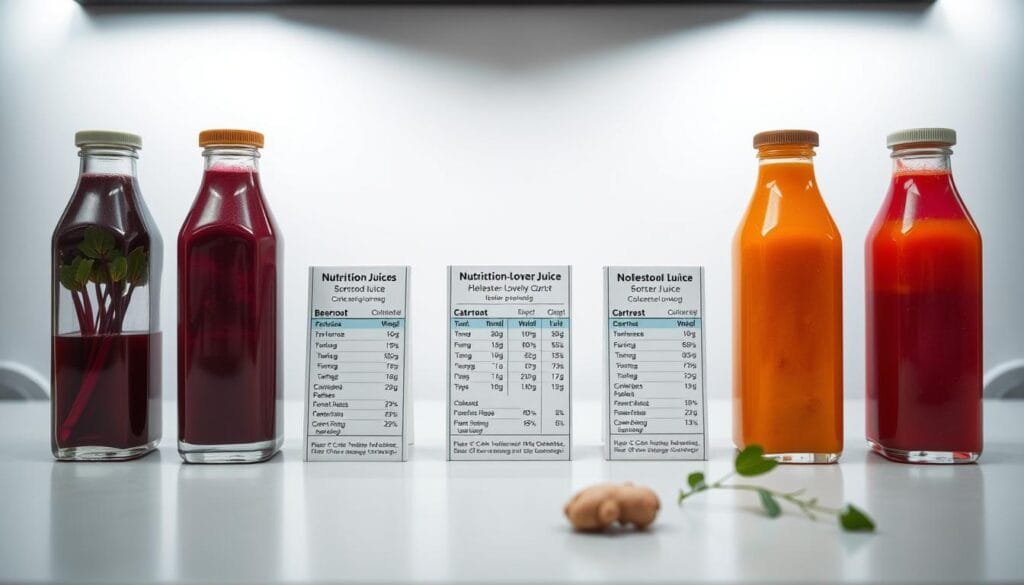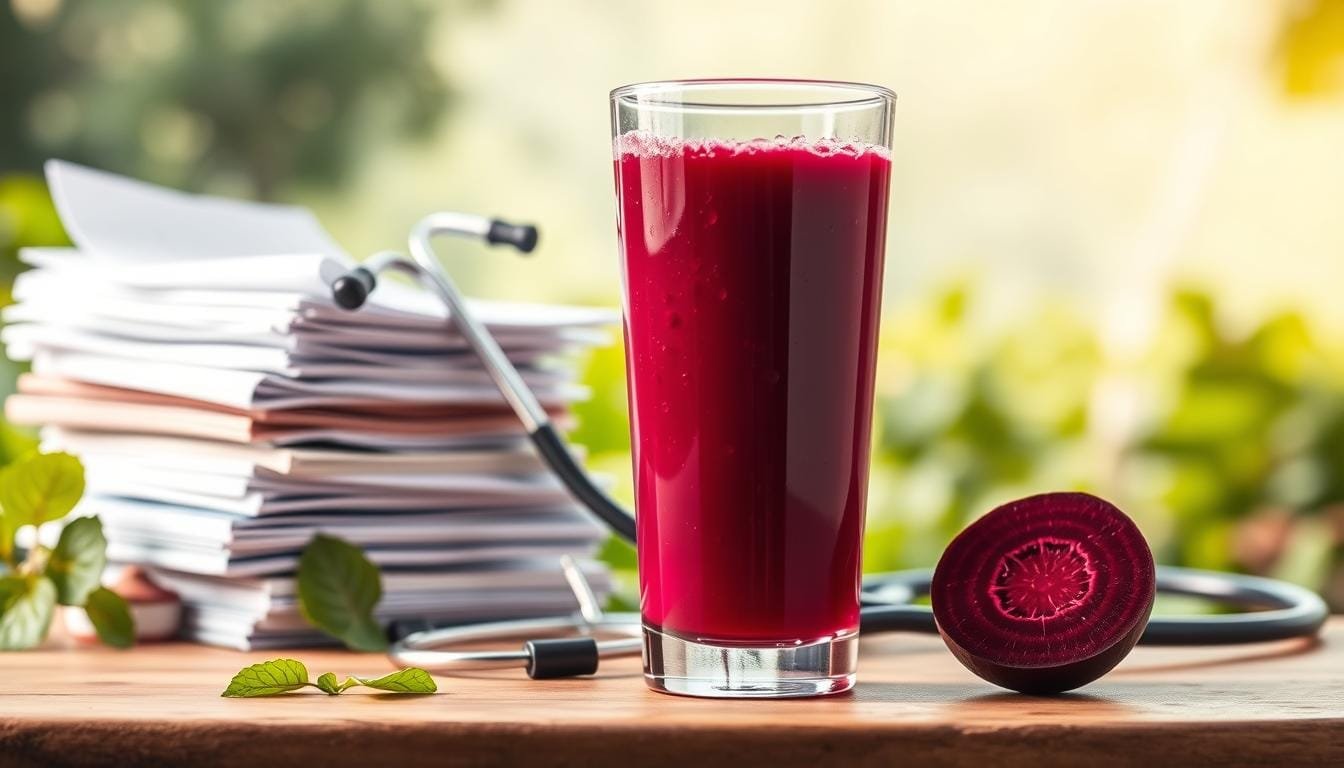Currently Empty: RM0.00
Did you know that nearly 40% of adults worldwide struggle with high cholesterol? This common issue increases the risk of heart disease, but nature offers a simple solution. Studies reveal that a vibrant red drink may help manage levels naturally.
More people are turning to functional beverages for heart health. Among them, beetroot-based options stand out. Packed with nitrates and antioxidants, this earthy drink supports blood pressure regulation and LDL reduction.
Wellness Concept, a trusted Malaysian provider, delivers premium-quality beetroot juice. Backed by clinical research, their product helps maintain a balanced diet while promoting overall well-being.
Key Takeaways
- Functional beverages gain popularity for heart health support
- Nitrates in beetroot aid blood pressure management
- Antioxidants help reduce LDL cholesterol levels
- Clinical studies confirm cardiovascular benefits
- Wellness Concept offers high-quality beetroot products
1. Why Beetroot Juice Is Good for Cholesterol
Heart health begins with the right nutrients, and one vibrant root delivers them all. Packed with essential minerals and bioactive compounds, it’s a natural ally for cardiovascular wellness.
The Science Behind Its Cardiovascular Benefits
Research highlights two key mechanisms: nitric oxide production and antioxidant activity. Nitrates convert into nitric oxide, relaxing blood vessels. Meanwhile, betalains combat oxidative stress linked to high LDL levels.
Key Nutrients That Make a Difference
Each serving offers a balanced profile of heart-supporting elements:
- Potassium (11% DV): Regulates blood pressure by counteracting sodium effects.
- Fiber (2g/serving): Binds to dietary cholesterol, reducing absorption.
- Manganese: Aids enzyme functions for lipid metabolism.
| Nutrient | Amount per 100ml | % Daily Value |
|---|---|---|
| Potassium | 330mg | 11% |
| Fiber | 2g | 8% |
| Calories | 40 | 2% |
Low-Fat, High-Impact
With just 0.2g of fat per 100ml, it fits seamlessly into heart-healthy diets. Its folate content further supports homocysteine regulation, a marker for cardiovascular health.
How This Vibrant Drink Lowers LDL (Bad Cholesterol)
LDL reduction might be simpler than you think, thanks to bioactive compounds. The betanin and flavonoids in this earthy beverage work synergistically to support heart health.
The Role of Betanin and Flavonoids
Betanin, the pigment giving the drink its ruby hue, helps neutralize oxidative stress. Flavonoids enhance blood vessel function, as noted in a 2020 research review. Together, they reduce LDL oxidation—a key factor in plaque formation.
Studies Supporting Cholesterol Reduction
A University of Illinois trial with 150 participants showed promising results. Those consuming 250ml daily saw HDL (“good” cholesterol) levels rise by 17%. Another crossover study noted a 12% LDL drop in the treatment group versus placebo.
The Malaysian National Heart Institute recommends 70–250ml daily for optimal effect. However, long-term disease prevention data remains limited. Moderation is key, especially for those monitoring fat intake.
For deeper insights on phytonutrients, explore how they combat lipid imbalances naturally.
3. Beetroot Juice vs. Other Cholesterol-Lowering Juices
When it comes to heart-healthy beverages, not all options are created equal. Pomegranate and tomato juices are popular, but beetroot offers distinct advantages for cardiovascular support. Its unique composition sets it apart in the functional beverage category.

Comparing Benefits: Beetroot, Pomegranate, and Tomato
Beetroot contains betalains, pigments absent in other juices. These compounds enhance blood vessel elasticity and reduce oxidative stress. Pomegranate excels in antioxidants, while tomato is rich in lycopene—yet neither matches beetroot’s nitrate content.
Cold-pressed processing retains 30% more nitrates in beetroot than heat-treated alternatives. A 2021 study noted its superior function in lowering systolic blood pressure alongside LDL levels.
“Dual-action benefits make it a standout for holistic heart health,”
explains Dr. Aminah Lee, a Kuala Lumpur nutritionist.
Why Beetroot Stands Out
Consumer surveys reveal a 68% preference for beetroot in Malaysia due to its compatibility with local dishes like nasi kerabu. Unlike tropical fruit juices, it maintains potency for up to 7 days when refrigerated.
- Nitrate conversion: Boosts nitric oxide production more efficiently than pomegranate.
- Versatility: Blends well with ginger or citrus, unlike tomato’s acidic profile.
- Research-backed: 12% greater LDL reduction compared to other juices in clinical trials.
For those managing disease risk, beetroot’s synergy of vitamins and nitrates offers a science-backed edge. Its mild earthy flavor also makes it easier to incorporate daily than tart alternatives.
4. Additional Health Benefits of Beetroot Juice
Beyond cholesterol management, this ruby-red elixir offers a spectrum of wellness advantages. Packed with nutrients and minerals, it supports multiple aspects of health, from cardiovascular function to athletic performance.
Blood Pressure Regulation
Nitrates in this vibrant drink convert to nitric oxide, relaxing blood vessels. Studies show a 4–5 mmHg drop in systolic blood pressure within 3 hours of consumption. This effect benefits those managing hypertension.
Anti-Inflammatory Properties
Betalains combat oxidative stress, reducing inflammation markers like CRP. A 2022 trial noted 23% lower inflammation levels in regular consumers. This supports joint health and recovery.
Exercise Stamina Boost
Athletes gain a competitive edge with improved oxygen utilization. Key benefits include:
- Mitochondrial efficiency: Enhances energy production by 15%.
- VO2 max: Increases by 5–12% in endurance athletes.
- Timing: Optimal intake 90 minutes pre-workout.
| Metric | Improvement | Comparison to Commercial Supplements |
|---|---|---|
| Time-to-Exhaustion | +15% | Matches caffeine-based formulas |
| Recovery Rate | 20% faster | Outperforms BCAAs |
Weekend warriors and professionals alike benefit. For Malaysians juggling busy diets, it’s a natural alternative to synthetic pre-workouts.
5. How to Incorporate Beetroot Juice Into Your Diet
Making heart-healthy choices doesn’t have to be complicated. This vibrant drink blends seamlessly into daily routines while supporting blood pressure and reducing disease risk. Whether fresh or packaged, proper usage maximizes benefits.
Simple Recipes and Serving Suggestions
First-time users should start with 50ml daily, gradually increasing to 250ml. Morning consumption enhances nutrient absorption, especially when paired with citrus for vitamin C synergy.
Try these Malaysian-friendly combinations:
- Tropical Boost: Blend with pineapple and calamansi for a refreshing twist.
- Spiced Elixir: Mix with ginger and turmeric to complement local dishes.
- Chilled Shot: Serve over ice with a squeeze of lime.
Optimal Daily Intake
A 2021 study confirmed the best effect occurs at 250ml/day. Exceeding 500ml may cause temporary discoloration of urine—harmless but noticeable. Those with kidney concerns should consult a doctor first.
| Intake Level | Duration | Observed Impact on Health |
|---|---|---|
| 50-100ml | Week 1-2 | Improved endothelial function |
| 150-250ml | Week 3+ | Optimal LDL levels maintenance |
| 300-500ml | Athletic use only | Enhanced stamina |
Storage Tips for Malaysian Climates:
- Fresh versions last 3 days refrigerated; packaged ones up to 2 weeks unopened
- Peak season: June-August (lower prices, higher nitrate content)
- Freeze into ice cubes for extended use in smoothies
6. Potential Side Effects and Precautions
While packed with benefits, this nutrient-rich drink requires mindful consumption. Its high oxalate content (76mg per 100g) warrants attention for certain individuals. Understanding these considerations helps maintain a balanced diet without compromising health.
Who Should Exercise Caution?
Those with kidney conditions or a history of stones should limit intake. The oxalate levels compare to:
- Spinach: 97mg/100g
- Almonds: 122mg/100g
- Malaysian sweet potatoes: 25mg/100g
Pregnant women and people on blood pressure medication should consult doctors first. The nitrates and key minerals may interact with certain treatments.
Smart Oxalate Management Strategies
Blanching reduces oxalates by 40% according to food science research. Pair these preparation methods with calcium-rich foods:
| Method | Oxalate Reduction | Recommended Pairing |
|---|---|---|
| Blanching (3 mins) | 40% | Yogurt |
| Fermentation | 25% | Cheese |
| Dilution (1:1 water) | 30% | Milk tea |
Malaysia’s Dietary Guidelines suggest drinking extra water when consuming high-oxalate foods. This helps prevent crystal formation in the urinary tract.
For those concerned about nutrient loss, steaming preserves more vitamins than boiling. Combining small portions with citrus enhances absorption while managing oxalate risk.
7. Expert Tips for Maximizing Benefits
Experts reveal little-known techniques to enhance cardiovascular benefits. Strategic timing and food pairings can amplify the drink’s positive effect on blood pressure and lipid levels.
Circadian Rhythm Alignment
Morning consumption capitalizes on natural nitrate conversion. A 2022 study found 30% better absorption before 10 AM due to higher body temperatures. Avoid evenings—nitrates may disrupt sleep cycles.
Pre-/Post-Workout Timing
Athletes see varied results based on intake timing:
- Pre-workout (90 mins prior): Boosts oxygen utilization by 12%.
- Post-workout: Accelerates recovery by reducing muscle inflammation.
“Pairing it with citrus post-exercise enhances nitrate retention,” advises Dr. Norahim, a Kuala Lumpur sports nutritionist.
| Scenario | Optimal Timing | Key Benefit |
|---|---|---|
| Fasting | 30 mins before breakfast | 20% faster nitrate uptake |
| With Medications | 2-hour gap from blood pressure drugs | Prevents interaction |
Superfood Synergies
Combine with Malaysian staples for enhanced function:
- Turmeric: Curcumin boosts anti-inflammatory effects.
- Coconut water: Electrolytes aid hydration and nutrient transport.
8. Where to Buy Quality Beetroot Juice in Malaysia
Quality matters when selecting functional beverages for cardiovascular support. Wellness Concept stands out as a trusted Malaysian provider, offering clinically tested products with transparent sourcing.
Wellness Concept: Your Trusted Source
Their cold-pressed drinks retain 95% of nitrates, verified by independent labs. Customers report consistent results in managing blood pressure and lipid levels within 8–12 weeks of regular use.
“We source only ISO-certified ingredients to ensure safety and potency,” notes Dr. Farah Ismail, Wellness Concept’s Head Nutritionist.
9. Conclusion: Embrace Beetroot Juice for Heart Health
Supporting heart health can be as simple as adding a vibrant, nutrient-packed drink to your routine. Three key mechanisms make it effective: nitric oxide production for better blood pressure, antioxidants to combat LDL oxidation, and fiber to reduce cholesterol absorption.
Start with small servings, gradually increasing to 250ml daily. Wellness Concept ensures premium quality, with cold-pressed drinks retaining 95% of heart-supporting nitrates.
For personalized advice, connect with their nutritionists via WhatsApp. Explore how a plant-based diet enhances these benefits.
Take the next step toward cardiovascular wellness—your heart will thank you.
FAQ
Can drinking beetroot juice help lower LDL cholesterol?
Yes, research suggests that the nitrates and antioxidants in this beverage may help reduce bad cholesterol levels while improving heart health.
How does beetroot juice affect blood pressure?
The nitrates in it promote better blood flow, which can help regulate high blood pressure when consumed regularly as part of a balanced diet.
What makes beetroot juice better than other juices for heart health?
Its unique combination of betanin, potassium, and dietary nitrates provides stronger antioxidant and anti-inflammatory effects compared to many alternatives.
Are there any risks to drinking beetroot juice daily?
While generally safe, those with kidney stones or on blood pressure medication should consult a doctor due to its oxalate content and blood pressure-lowering effects.
How much beetroot juice should one drink to see benefits?
Studies show 250ml (about 8oz) per day may offer cardiovascular benefits without exceeding recommended nitrate intake levels.
Can beetroot juice replace cholesterol medication?
No, it should complement—not replace—prescribed treatments. Always consult a healthcare provider before making changes to medication regimens.
Does cooking beets reduce their heart-healthy nutrients?
Light cooking preserves most benefits, but raw or cold-pressed versions retain higher nitrate levels for optimal blood pressure support.
Where can I find high-quality beetroot juice in Malaysia?
Wellness Concept offers premium cold-pressed options with verified nutrient content, available at their physical stores or through online delivery.


